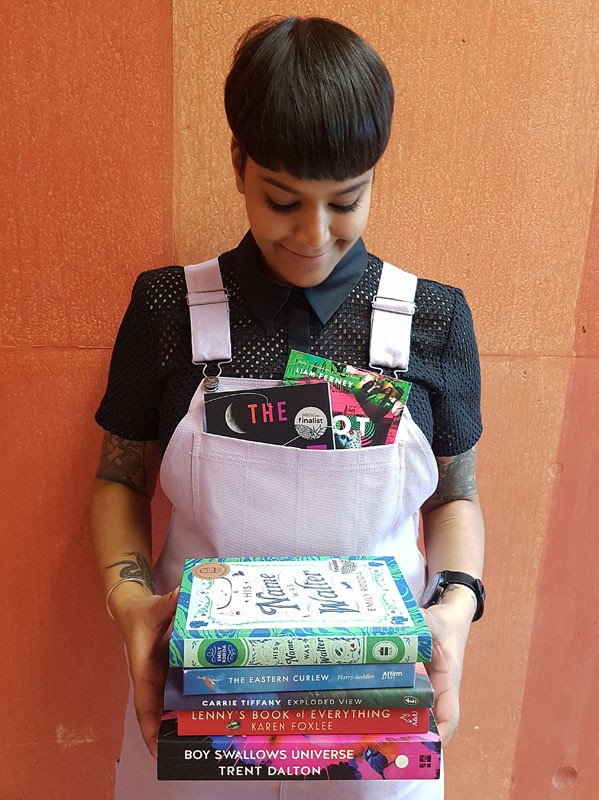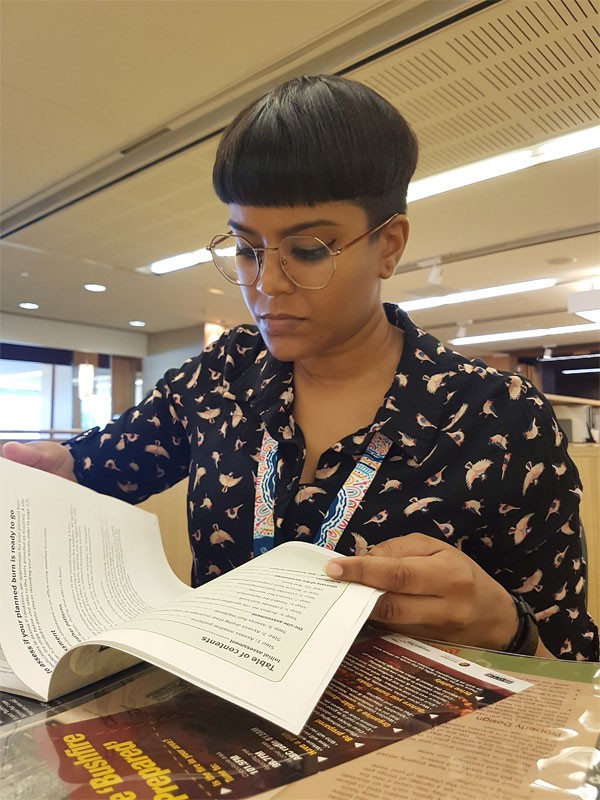The Archive as Exploded View: Reading the Fragments
By administrator | 11 February 2020
Hi! I'm Shastra, State Library of Queensland's inaugural reader in residence. I'm a writer, reader, and PhD candidate at The University of Queensland, where I'm trying to create poetic nuclear waste warnings that will withstand deep time. Since the middle of January, I've been roaming State Library's collections, reading Queensland Literary Awards winners and finalists, and writing poetry inspired by these works. If you see me, please say hello!

I was lucky enough to start my residency by reading the winner of the 2019 Griffith University Young Adult Book Award, Karen Foxlee’s Lenny’s Book of Everything. This book so deftly handles the reverberations that our leavings and stayings have on the people we love, and the ways absences and presences echo out into history.
I was moved by Lenny’s father—a character whose absence occupies more narrative space than his presence—and wrote a short poem with him in mind, which ends as such:
Minutes from now as he rises to drop
his peel into the sink, he will topple
the empty teacup balanced
on the arm of his wing
chair. Years away
a child whispers his name
in her sleep.
He will watch the cup fall for no
more than three moments before turning to reach for
the dustpan, safe
in the knowledge
that nothing has happened.
I’ve been thinking, perhaps too much, about the idea of “nothing happening”: how an absence of happening is more often an absence of
memory, of listening, of record. A gap. I began reading Carrie Tiffany's Exploded View—winner of The University of Queensland Fiction Book Award in 2019—days after I finished Lenny’s Book of Everything, and was surprised by the narrative links I ended up drawing between them. An “exploded view”, rife in the implication of violence, is an informative diagram that separates the individual parts of a mechanism—in Tiffany’s book, a series of cars in 1970s Australia. In them, fragments float in white space. Tiffany’s unnamed protagonist, also a teenager, says, “In the manual you can choose to look at the parts, or the air in between them."
"The air in between isn’t nothing; it isn’t blank. If you make yourself look for what’s not there the empty spaces become parts themselves.” (27)
More and more, the library archive seems to me like something of an exploded view. Memory down to its parts and pieces, the empty spaces—what isn’t preserved or remembered—indicative of its precarious nature. I had the opportunity to speak to Joan Bruce, a Specialist Librarian with the Queensland Memory team, about the work that goes into preserving and accessing State Library’s more delicate collection items—reels of footage, newspaper chronicles. Ivy Pearce Hassard’s Flying Jacket. “The floodgates of memory,” said Joan, after sending me in multiple directions towards collection items used by artists and writers to inspire creative works, “have obviously started to creak open.” Memory as floodgate. As fragment and air. At State Library memory is made concrete, both in terms of library as structure and the collections held within it.

A few weeks ago I was sitting in the John Oxley Library Reading Room with a box of bushfire ephemera, tracking shifts in language around fire warnings, when I remembered—suddenly, unexpectedly—a moment in Nicholas Rombes’s novel The Absolution of Roberto Acestes Laing. Early in the novel, the narrator recalls the moment his college physics professor wrote the date and time on a piece of paper and set it alight, claiming that no information is ever lost:
“In that burning paper the markings of ink on the page are preserved in the way the flame flickers and the smoke curls. Wildly distorted to the point of chaos, the information is nonetheless not dead. Nothing, really, dies. Nothing dies.” (36)
Nothing dies, not even that which is forgotten, or not remembered in the first place. Much lives in the air between the parts.
I’ll be reading and residing at State Library until mid-March. Please feel free to approach me and chat—I’d love your book and collection
recommendations!
Comments
Your email address will not be published.
We welcome relevant, respectful comments.